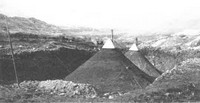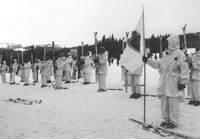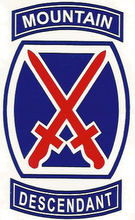PHL! MEMORIES. by Elton Turek
WORLD WAR II MEMORIES OF ELTON TUREK
PROUD,
TO HAVE SERVED MY COUNTRY,
HAPPY,
TO HAVE TRAINED IN THE MOUNTAINS,
LUCKY,
TO HAVE SURVIVED, SAFE AND SOUND, AND COME
HOME
TO HAVE A WONDERFUL LIFE
WITH A WONDERFUL WIFE!
Turk is a wonderful storyteller, fulI of enthusiasm, as usual. The most felicitous phrases are probably his.
It has been a pleasure and an honor to string his stories into a narrative.
Libbie Merrow

PREFACE
In 1939, C. Minot (Minnie) Dole, head of the National Ski Patrol heard how Finnish Ski Troops, in their white uniforms, had skied silently through the woods and surprised Russian troops who were stogging along the plowed roads. After the battle, the Finns slipped back into the woods and the Russians couldn't follow. Later German mountaineering troops used rock-climbing skills to surprise a British troop resting complacently on a high ridge. "Great!" thought Minnie and he began a persistent campaign to found an American Mountain Division. He fought and fought for his idea. The O.K. was given in April of 1941.
JOINING UP
In the summer of 1942, Elton Turk was a trainee in the Engineering Department at Pratt and Whitney. He'd been there for two years. Though the U.S. had been in World War II for six months, Turk hadn't been drafted yet because he was classifled as "Essential to the War Effort". Besides, he was the sole support of his widowed mother. But he really, really wanted to get l¡rto the war! This was a time of raging patriotism and "everyone else" was off to the wars.
When they announced the formation of 'Ski Troops', Elton could stand it no longer! Elton loved to ski! He had started onlhehill of Buena Vista in West Hartford, where, he says, 'We slid down every way imaginable." That included skis. It was up and down those hills, climbing and carrying your great long skis or doing the herringbone. You really earned the trips downhill. Around Junior High he graduated to the rope tows at Blandford and on to the higher hills.
While at Pratt and Whitney, he founded a ski club.
As the hostilities in Europe heated up, the U.S. was supplying lots of arms for the Allies and lots of them came from Connecticut. Espionage was considered a serious threat. Elton and his friends formed a volunteer Ski Patrol, hiddng and skiing through the wooded mountains of Connecticut and Massachusetts looking for spies. It was a serious business, but it was also play, playing at war.
In August, Just after his twentieth birthday, Elton Turk enlisted in the 'Ski Troops", the first and only mountain division in the Army. The troop was nicknamed 'The Bluebloods" because sking was considered a wealthy man's sport.
They had an unusual number of college graduates and young executives. They also had skilled Olympic skiers from around the world like Walter Prager, from Switzerland who had been the Dartmouth Ski Coach, Friedl Pfeifer from Austria, and Torger Tokle, a famous jumper from Norway.
Such was their prestige and popularìty that you had to have three letters of recommendation just to enlist! Turk letters came from his boss at "The Aircraft", his mirrister, and his High School Principal. Of course, they all said he was wonderful, and the Ski Troops accepted him.
As a last hurrah, before he had to report for duty, Turk and a buddy went to watch the Yankees and the Cardinals in the World Series. They took the train to New York, stood in line for tickets all night, got in the Park at eight in the morning and then waited until the game started at one. All this from a lifelong Red Sox fan!
CAMP HALE
Meanwhile, the Army was searching for the perfect place to build a training camp for the ski troops. Yellowstone? Too sacred. Aspen? Too expensive.
Pando? (Pando: a desolate ice cutting enterprise next to a huge swamp. The ice was packed around produce headed East from California.) Just right! The government owned most of it already. It had a 'highway" and a ten-mile spur from a transcontinental railroad. It was almost two miles above sea level, a marshy valley in a bowl of mountains.
So, starting in March 1942, in nine months, a river was diverted, the marsh drained, the road rerouted and a huge army base was built. It was called 'Camp Hale" after a Spanish American war hero who had gone on to start the first "electric car" system in Denver and to found the V.F.W. Camp Hale was like a small city with housing for 15,000. They had a hospital, stables, mess halls, churches, a field house, everything a Division might need, all for $33,000,000.
The barracks were two stories, and except for the lavatories, a ski room, and upstairs, rooms for non-commissioned officers, each story had just one big room with two rows of cots. The lights went out at 10, no matter what. Turk was glad when he made Corporal and could move to a room with only two others, and could keep the light on all night if they wanted to. Believe it or not, no one had a pin-up girl in those baracks! They had 'pin-up mountains" instead, pictures of the world's most beautiful mountains.
 The arrow marks the barracks where Turk lived
The arrow marks the barracks where Turk lived
Turk went into the service October 30, 1942.
First the men went to Camp Carson in Colorado for their Basic Training, since Camp Hale was still being built. Basic Training is supposed to be awful but Turk and his new friends found it particularly aawful to be in the hot, dusty flatlands marching and marching, when they had enlisted to be skiing in the mountains. Turk says, 'They were just keeping us busy."
When the new camp was finished, in December of '42, Turk's group was the flrst to move in.
While you are thinking about Turk and the training at Camp Hale, remember that, in retrospect, Camp Hale, at 9,800 feet, was 'way too high. They were never to have to fìght at such a high altitude and it made everything about their training that much more strenuous. The snow was deep and the cold was terrible, sometimes 40 degrees below zero!
On the march, each man carried a 90-pound pack, (Turk weighed only 150 pounds himself), plus his rifle, and skis or snowshoes. The skis were seven to seven and a half feet long, of solid, heavy hickory. Their "Trail Shoes" were five feet long, turned up at the front. They were great for downhills. You could sit on them, grab the toe and negotiate the steepest of slopes. As for rock climbing, they used pitons and carabineers. Their motto was, "We Climb to Conquer!"
Except for the fact that they weren't being fired at, the training was as tough as combat.
Many found they just couldn't take it and transfered out.
John Jay, the pioneer in hilarious ski movles, was a First Lieutenant and an excellent skier. His advice and instruction were a great help to the enlistees.
Their uniforms were reversible ski pants and parkas, white on one side and Olive Drab on the other. So were their tents. They had two man tents with about four foot sides and a floor, all in one piece with a tunnel like entrance. The men would take off their boots and crawl down into their sleeping bags, taking their boots into the bags too to keep them warm. They had only a candle for light but the little candle gave off so much warmth and the tents were so airtight that the men slept in T-shirts. The tents were truly waterproof too so in the morning there would be lce, condensed from their breath, all over the ceiling. One had to be very careful getting up. If you touched the roof a shower of ice would cascade down your back.
The first two months, everyone was a rifleman on skis. They were called the 'Tenth Light Infantry". Then a great meeting was called. The Tenth Light was to become the Tenth Mountain Division and some of the troops were to use snowshoes instead of skis and carry heavier weapons. Turk was very disappointed to hear he was one of them! From then on, he was, offlcially, part of the Tenth Mountain Division, 87th Mountain Infantry Regiment, 3rd Battalion, M Company, Heavy Weapons Platoon.
Turk was a machine gunner, head of a five-man unit. Two carried the parts of the gun, and three, the ammunition. Machine guns were for rapid fire. The Tenth also had mortars, for short range, and artillery, the heaviest guns, for long range. Artillery had a lot of practice, you might even call it fun, firing to knock down avalanches.
Of course there were no roads in the wilderness. Mules did all the heaviest carrying. Those Government Issue mules got the best possible treatment. Each night, feeding the mules and putting them in the stables or rope corals came first, even before feeding yourself.
Turk's mule was called 'Big Red". The men rode their mules on the weekends, but only Offlcers were allowed to ride on a march. One Sunday, there came an emergency call to rescue the mules that were trapped in deep, wet snow. The sun was bright and hot, the air clear and thin and deep trenches had to be dug to free the mules.
According to Army records, 30% of the men had frostbite. Some of them took off and walked back to camp. There they were met by a big sign on their barracks door that said 'Nein!" The baracks were full of German prisoners of war in transit to somewhere else. So the men had to walk back to Homestead. All in all the Homestead Lake exercise was pretty much a disaster. They were up there six weeks! One captain said after-wards, "Any man who transfers to combat from Camp Hale is a coward!"
KISKA
Did you know that the Japanese actually invaded United States territory? They seized three small islands at the end of the Aleutians. U. S. Infantry had recaptured two of the islands with heavy casualties on both sides. The Tenth was chosen to take back the third island, Kiska. Intelligence said there were 10,000 Japanese there. It was a barren volcanic hunk of rock, a few miles wide and about ten miles long. Dense fog and driving rain made it seem still more desolate.
To train for the invaslon the Tenth was sent to Oceanside, California, a few miles from Carmel. From the beautiful mountains to the beautiful beach! There they practiced amphibious landings.
On July 29, 1943, the 15,000 men of the Tenth were packed onto Victory Ships.
Turk's ship was the U.S.S. Zeiland.
The night before they were to leave San Diego, they were anchored very close to the shore. They could see the bright lights and hear the excitement of the city.
Who knew what lay ahead? The temptation to go have some fun was too much for two fellows. They tied their clothes in plastic bags, 'borrowed" Navy lifejackets, dove overboard and headed for shore. Everyone else crowded to the rail to cheer them on. The ship began to list dangerously. The Captain did not think it was funny and the men were picked up in a launch and sent to the brig first on the ship, then on shore, accused of stealing Navy equipment. Once the army is on a Navy ship, the Navy has complete command. Those men never made it to Kiska, but the rest of them sailed the next morning.
No Japanese fired at them while tlley were on the beach. There was no sound at all from the hills. Double file, the men made their way to the center of the island. On the way they passed abandoned Japanese campsites, some with still warm food. Where were those pesky Japanese anyway?
They set up tents, got the camp orgariized and had supper. Night fell. Oh, nol Suddenly the call came, "Gas attack alert!" The thought of being gassed was horrible. Everyone knew of World War I Veterans with ruined lungs. How the men ran, stumbling and tumbling through the darlaness, back to the beach to feel around on hands and knees for their masks! Most were not found, but it was O.K. for there was no gas attack that night.
Later that night, back at camp, something serious and dreadful did happen. In every war there are casualties from the cruelest of callses, so called, 'friendly fìre". The percentage ls quite high. That night, the units took turns keeping watch, nervously defending the camp from the ever-expected attack by the Japanese. Someone shot a rifle, the bullet hit a rock and ricocheted off, causing sparks. The machine gunners reacted instinctlvely and shot into the night.
Alas, several of their own troops were out there and some were killed.
Those were the only casualties the Tenth had from gunfire on Kiska. It soon was discovered tllat the Japanese had evacuated completely when they saw the Americans coming. Under the cover of the constant pea soup fog, they had escaped in submarines. They wre gone, but they had left behind many traps.
The island was riddled with caves and tunnels and many with tempting "souvenirs", a rifle, or a piece of uniform, which was booby trapped to explode when touched. The orders were NOT to fool around with souvenirs, but, nevertheless, a couple of men were lost that way.
 One of the flrst priorities was to get the camouflage paint off their faces.
One of the flrst priorities was to get the camouflage paint off their faces.It wouldn't wash off! So several took a mass bath in a pond. Picture forty or fifty nude men in that freezireg water.
The men dug in for the long haul. "Dug in" is the right expression, for their 16'xl6' tents, with their 4' sidewalls, were set up in big holes, 6' deep, to protect the men from bombing.
 They stayed four or five months. Turk spent his 21st birthday there, on Friday, August 13th. They really appreciated the Navy who regularly brought in their supplies. But then, how to get tlle supplles to camp? The soil on the island was powdery and turned into gooey muck when wet. They built corduroy roads, (logs placed side by side), for trucks to brlng in supplies.
They stayed four or five months. Turk spent his 21st birthday there, on Friday, August 13th. They really appreciated the Navy who regularly brought in their supplies. But then, how to get tlle supplles to camp? The soil on the island was powdery and turned into gooey muck when wet. They built corduroy roads, (logs placed side by side), for trucks to brlng in supplies.They built huge, high docks for the large troop ships, whfch would come to pick them up. That was the hard work.
There was fun too. It was fun to climb the volcano that rose 4,000' out of the sea. Turk and his friends climbed it in October and were proud to think they were the first white men to ever reach the top. They set up a shelter and left a notebook in which every man signed his name and address.
 It was fun to see the rare blue fox. The men had orders not to shoot them.
It was fun to see the rare blue fox. The men had orders not to shoot them.There was a lake loaded with lovely trout. There was no fishlng gear but one bright fellow got the idea of throwing a grenade in the lake. The fish blew up into the air and landed at their feet! The offlcers soon put a stop to that!
December,1943, they left the lsland. For two weeks they were quarantined, as was the procedure for anyone returning from overseas duty. No passes were lssued; no visitors allowed.
STILL MORE TRAINING...
January, 1944, saw the Tenth Mountain Division back in Camp Hale. By now they had been tn the Army for almost a year and a half. They were sick of training and impatient! They wanted to get into the war. At that point, most of the action was in the deserts of Africa, hardly the place for an elite ski troop! So they languished and griped and trained some more.
That winter, they went on the infamous 'D Series" of maneuvers, known to be the toughest any army ever had. They were even harder than Homestake Lakel For six weeks they were on the top of the peaks that are no\M the fancy resort called Vail. The temperature was 20, 30 or 40 degrees below zero and ttrere were heary snows and strong winds. The men had only their tents for protection. No fires were allowed. Many had to be evacuated because of frostbite or frozen lungs. Everyone suffered, but they enjoyed the test too. By now the elite Easterners had been joined by outdoorsmen from the West too, loggers, ranchers and guides.
The men of the Tenth were strong and tough.
Finally in June of 1944 they were shipped to Camp Swift, Texas for still more training, this time in flat land infantry fighting and in river crossing.
What a contrast to Camp Hale! It was flat and incredibly hot. As an introduction, they were shown glass jars with examples of tarantulas, rattlesnakes, scorpions and other poisonous things to be avoided. Many bought hammocks to avoid the crawly things at night. The men learned to soak their mattresses with water so the evaporation would cool them of a bit at night.
Frustration grew! The U.S. seemed to be winning the war and the Tenth hadn't even gotten overseas". The National Ski Patrol had close ties to Washington and pleaded their case. It seemed no one wanted such a specialized division. Eisenhower said they were just "green troops". But when General Mark Clark heard they were ready he said, 'I wlll take that Division anytime!"
ITALY
 So, December 21, 1944, they left Camp Swift, on their way at last. 15,000 troops and the mules! January 4, 1945 they embarked from Newport News, Virginia on the U.S.S. West Point. That was a treat! It had been the famous luxury cruise ship The America. Though the troops were packed in, they were treated very well, with great food.
So, December 21, 1944, they left Camp Swift, on their way at last. 15,000 troops and the mules! January 4, 1945 they embarked from Newport News, Virginia on the U.S.S. West Point. That was a treat! It had been the famous luxury cruise ship The America. Though the troops were packed in, they were treated very well, with great food.The ship was so fast it could outrun any sub so they didn't have to wait for a convoy.
Zigging and zagging, they made their way across the Atlantic. Nights, they ran without lights. They sailed past the Straits of Gibraltar, a familiar and thrilling sight, then through the Mediterranean to Naples.
Once there, they crammed into boxcars, riding in to the mountains a¡rd tnto the war. These elite specialists, trained as Mountain Troops for so many months, were about to go into battle at last!
They reached Florence in late January, 1945. The Italians has surendered in September, 1943, but the Germans were still holding on to the mountainous North.
The 10th Mountain Division's Job was to cross the boot of Italy and break through the German 'Gothic Line" at the crest of the Apennirees, then descend to the Po Valley and thence up into the Alps. The 'Gothic Line" included Mount Belvedere and, even higher than that, Riva Ridge. They were both just so steep and rock. The Germans were sure of their strength up on those 'unclimbable" cliffs. After all, they had already repulsed the Fifth Army twice.
training was worth it.
HEADQUARTERS IV CORPS
The Commanding General
SUBJECT: Commendation
TO: Commanding General
10th Mountain Division
APO345, U.S. Army
The splendid performance of the offrcers and men of the 10th Mountain Division while a part of the IV Corps' attack in the Fifth Army offensive from 14 April to 28 April inclusive, was such as to evoke unqualified praise in all military circles, and it is my desire hereby to commend you, your offrcers and men, in the very highest terms.
In fifteen days of arduous fighting, the 10th covered 105 miles in a northerly direction, an average advance of 7 miles per day. During that period you broke through the enemy Apennine defenses on you front with such impetus as to split three enemy divisions, inflicting heavy losses in men and material and throwing these many units into a state of utter confusion.
On the 7th day of your altack, advancing into the Po Valley with admirable speed, you cut highway 9 and threatened Bologna by thrusting beyond it well to the north. The infantry and annor under your cornmand raced on to seize the southern bank of the Po River and, by the evening of 23 April, with scarcely a pause, you had est¿blished a firm bridgehead across that major obstacle. Allowing the bewildered and beaten enemy forces no respite, the 10th then thrust on to seize the Villafranca aþort and the city of Verona, which your elements had cleared by early afternoon of 26 April.
Bearing northwestward, you continued the pursuit of the enemy with such relentless speed that, by the evening of 28 April, your leading elements were a good three fourths of the way up the eastern shore of Lago di Garda. At this point, the 10th was detached from IV Corps, but we continued to watch with the gteatest admiration your further northward progress, which demonstrated conclusively the fure physical condition and offensive spirit which was still maintained, even though your oflensive had continued by this time without cessation for more than three weeks.
The story of the fifteen days from 14 April to 28 April establishes for the 10th Mountain Division a record of which every offrcer and man can be justly proud. These battlefield accomplishments are now known to the entire army. Seldom has a single division contributed more effectively to an offensive which has so decisively thrown enemy forces completely off balance.
IV Corps was fortunate to have the stalwart l0ü Mountain Division available to deliver its main attack in this final offensive, and the HQ is fully aware of the important contribution you made to our success in defeating the enemy in Northwest Italy, and bringing about the cessation of hostilities.
/s/ Willis D. Crittenberger
Major General, U.S. ArmyCommanding
Commanding
The Air Force was always above, providing support. Noise was constant. Turk says their shovels were as important as their rifles. Anytime they stopped, for any reason, they began digging a foxtrole to get out of the firing.
Men in combat see horrific things. Human flesh is no match for bullets and shells. What Turk saw, he would like to be able to forget. A gentle man, he doesn't want the ones he loves to know about these horrors and then be haunted by them too. So you won't read the details but it's enough to know that they were the spearhead, the Front Line. The Germans had the advantage of commanding the mountaintops and The Tenth was constantly being hit with everything the Germans could find. 993 members of the Troop were killed in Italy, including the famous Toger Tokle and 4,145 were wounded. Turk says, 'When a man is frightened, he can do unheard of things, automatically, to protect his buddles and save his own life. Medals don't mean a darn thing! Getting the 'Combat Infantryman' badge meant more".
Nevertheless, you will want to know how Turk earned his Bronze Star. Telephone communication had been cut off between four forward gun emplacements and headquarters. Turk went out to restring the wires. The Germans knew what was going on and it seemed that each step he took a shell exploded behind him! Several times he was loaocked down by the concussions. But the wires went up!
The men of the Tenth were the first Americans to cross the Po River. Ten to twelve men rode the large rubber Zodiac style rubber rafts. The Po is a broad river and they were being flred at and shelled all the way. Half way over, Turk's raft hit a sand bar and they all leaped out and pushed ttre boat free. Turk still couldn't swim so it was an especially adventurous trip for him.
They climbed on through the beautiful Apennines. In the tiny Alpine village houses, the animals lived on the first floor and the people on the second and third floors. The villagers helped the Americans as much as they could, telling them where the Germans were, and giving them wine they had kept hidden, and bread and vegetables.
Between villages, they marched single file, at least ten feet apart, so, if shot, only one would be killed. Turk was out of sight of his friends when a young German appeared, running towards hlm with his hands in his pockets. Turk thought 'Grenadesl" and raised his bayonet, motioning to the boy to take his hands out of his pockets. The boy did and out fell coins, family pictures and a rosary. Turk let him put his treasures back in his pockets and sent him to the rear. That was the system. The many Germans who were surrendering were sent to the rear of a column where the M.P.s took their guns and left the men in secured place. The prisoners were fed well and not hurt, although they may have been cussed at some.
On the night of May 29,1945, Turk and some of his buddies were holed up in the cellar of the shell of a bombed house, sitting in the corner, thinking, as they had thought every night for 114 nights, 'I hope I can see tomorrow. I hope I live through the night!" Suddenly there was no sound of guns; there was stillness, quiet, and hope. In the morning they learned the European War really was over. Jubilant, they ran from foxhole to foxhole screaming, 'The war is over! We can go homel"
They had fought two hundred miles, across the boot of Italy and reached Lake Garda in the Dolomites. Thousands and thousands of German soldiers were there too. There was no way to disarm them all so the Americans and Germans, each fully armed, lived together in the small towns. They called each other, 'Komrade" and 'Comrade".
Next Turk had a short stint as part of the Occupying Troops in Yugoslavia. There was trouble with Tito. Once Yugoslavian troops faced the Tenth across the Izona River with guns drawn on both sides. Nothing happened.
Each of the Americans in Europe was assigned points, by the amount of time he'd been overseas, battles fought, and medals earned. You needed 85 points to be sent home. Turk had them and he and his good old mule, Big Red, were among the first to leave, embarking from Italy August 2. They had one long, grand party as the crowded huge troop ship crossed the Atlantic, lights blazlnrg. Everyone was laughing and happy.
Only one thought worried the men. Japan was still at war with the U.S and everyone expected an invasion of Japan. The Tenth would surely be back in battle soon. Instead, the news of the dropping of the atomic bombs came over the radio. Now World War II was surely over! Peace, at last!
AFTERWORDS
It's hard to overestimate the ir¡fluence of the men of the Tenth Mountain Division on the ski industry. Several veterans founded ski areas, like Vail, Arapahoe Basin, Aspen; some, including Elton, opened ski stores. Surplus skis and sleeping bags were sold for five dollars apiece, but they only whetted people's appetites for better equipment. Turk and Gus Sunne opened Veteran's Ski Shop on Asylum Avenue in downtown Hartford back when all the biggest stores were in downtown Hartford and all the biggest insurance companies had their home offices in downtown Hartford. Veteran's was the best ski store and everybody's favorite place to shop. Turk and Gus were friendly and knowledgeable.
One day, when business was slow, Turk was standing outside the door in the sun. Along came a really attractive young woman whith an artist's portfolio under her arm. They talked. She was Jean Hughes, on herway from the 'Y'to G.Fox to apply for a job as a display designer. We all know the result of that sunny meeting, one figure skater, two ski racers and six grandchildren who love to SKI !
















